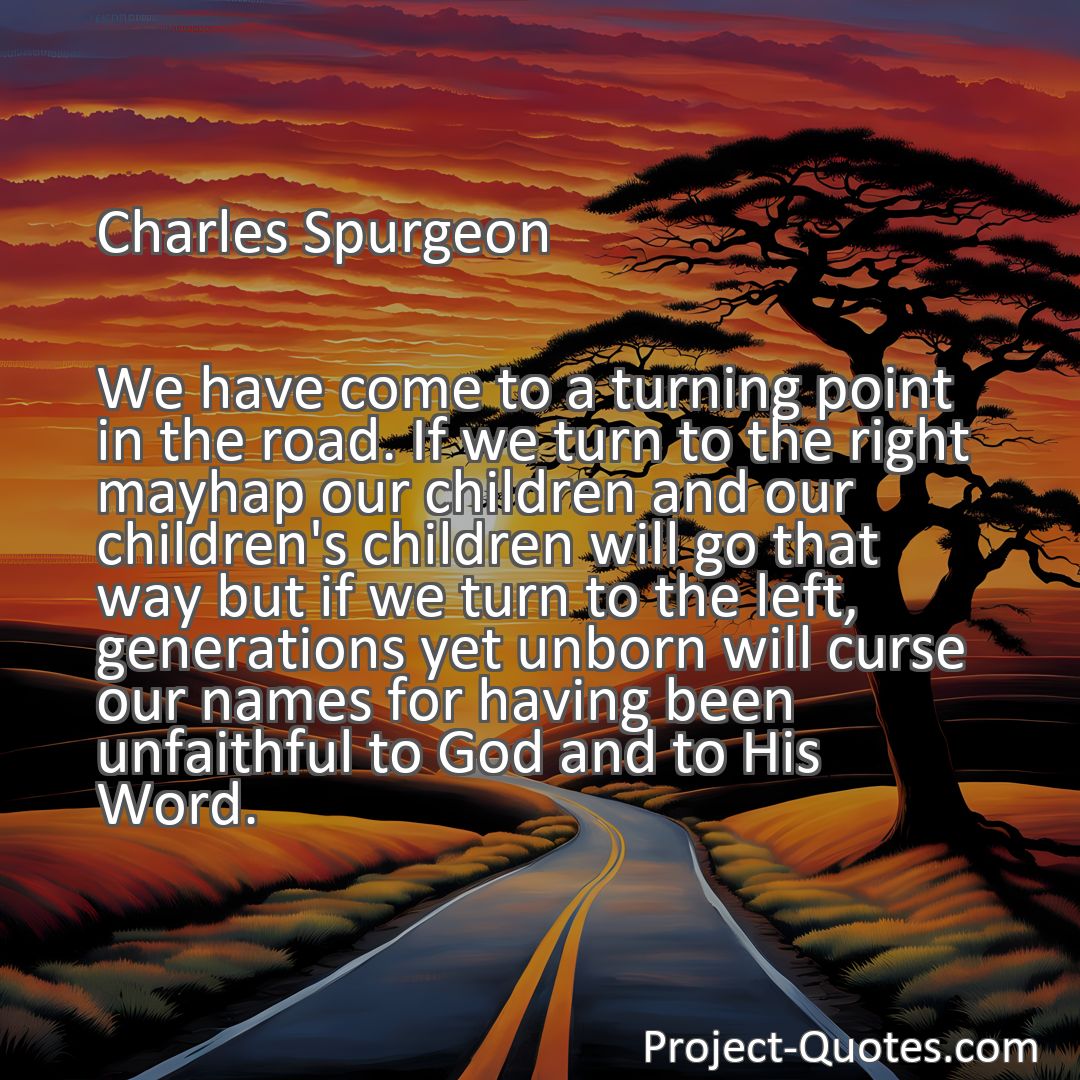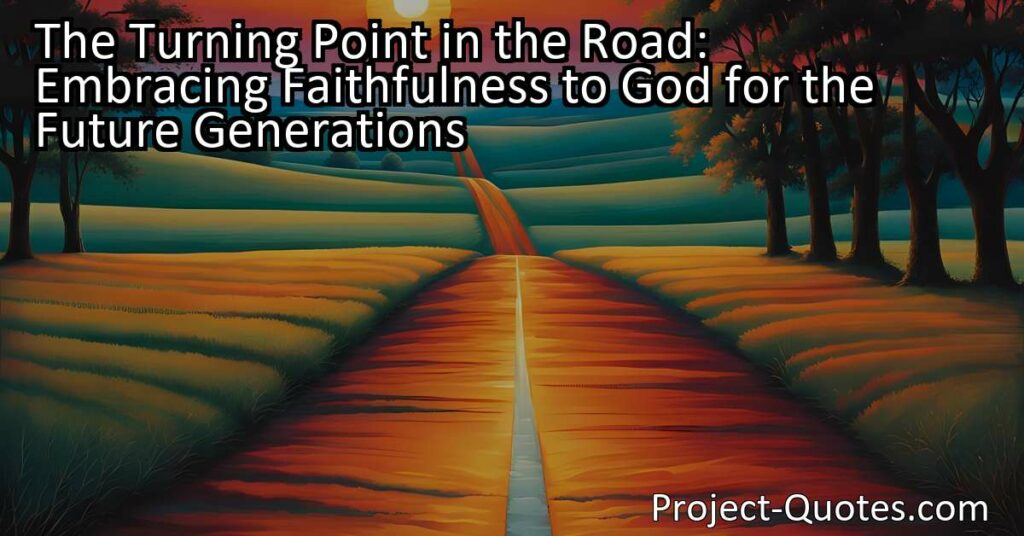We have come to a turning point in the road. If we turn to the right mayhap our children and our children’s children will go that way but if we turn to the left, generations yet unborn will curse our names for having been unfaithful to God and to His Word.
Charles Spurgeon
The Turning Point in the Road: Embracing Faithfulness to God for the Future Generations Charles Spurgeon’s quote serves as a profound reminder to consider the potential implications of our decisions for ourselves and future generations. By emphasizing faithfulness to God, the significance of His Word, and our moral responsibility to our descendants, Spurgeon urges us to approach this turning point in the road with conscientiousness and prudence, ensuring a future marked by righteousness and a worthy legacy.
Table of Contents
- 1 We have come to a turning point in the road. If we turn to the right mayhap our children and our children’s children will go that way but if we turn to the left, generations yet unborn will curse our names for having been unfaithful to God and to His Word.
- 2 Charles Spurgeon
- 3 Meaning of Quote – We have come to a turning point in the road. If we turn to the right mayhap our children and our children’s children will go that way but if we turn to the left, generations yet unborn will curse our names for having been unfaithful to God and to His Word.
- 4 Freely Shareable Quote Image
- 5 Related
Meaning of Quote – We have come to a turning point in the road. If we turn to the right mayhap our children and our children’s children will go that way but if we turn to the left, generations yet unborn will curse our names for having been unfaithful to God and to His Word.
In the words of Charles Spurgeon, a renowned preacher and theologian, “We have come to a turning point in the road.” Within this eloquent statement lies a profound message that calls upon individuals to make a conscientious decision that could impact not only their own lives but also the future generations to come. Spurgeon highlights the significance of this critical juncture by presenting two distinct paths, one leading towards the well-being of our descendants and the other towards their potential dismay. As we analyze this quote further, let us delve into its underlying themes, exploring the notions of faithfulness to God, the significance of His Word, and the moral responsibility we hold towards future generations.
First and foremost, Spurgeon stresses the importance of faithfulness to God. In his words, he implicitly urges his audience to seek the path which aligns with God’s teachings and principles. For believers, this notion encapsulates the idea of embracing a righteous and devout lifestyle, guided by moral and spiritual values. By cautioning against potential unfaithfulness, Spurgeon reminds us that our actions have consequences that extend beyond our immediate circumstances.
Moreover, the preacher emphasizes the significance of God’s Word, portraying it as an essential compass when encountering crossroads in life. The authority and guidance offered by religious scriptures hold the potential to influence our decisions and shape our morality. Through his words, Spurgeon encourages his listeners to consider the principles laid out in these sacred texts when making choices that could have far-reaching implications.
Considering the potential outcomes of choosing the wrong path, Spurgeon warns that future generations may curse our names. This particular statement reflects the interconnected nature of human existence and the responsibility we hold towards the well-being of those who follow in our footsteps. As parents, teachers, and mentors, it is vital to recognize that the choices we make today can greatly impact the lives of our children, grandchildren, and countless others who are yet to be born. Spurgeon’s eloquent portrayal of this responsibility serves as a reminder that the decisions we make should not be taken lightly, for their consequences extend far beyond our own lifetimes.
When reflecting upon the quote as a whole, it becomes evident that it serves as a call to action, impelling us to approach this turning point in the road with careful consideration and prudence. As we stand at this proverbial crossroads, we must evaluate our circumstances, our beliefs, and our values before making a decision. The consequences of our choices may extend well beyond our personal lives, shaping the course of future generations.
If we choose to turn to the right, as depicted by Spurgeon’s words, it represents a path of righteousness, faithfulness, and adherence to the teachings of God. By selecting this route, we align ourselves with the values and principles that provide solace, moral guidance, and a sense of purpose. Furthermore, by faithfully following the path of God, we pave the way for our children and their descendants to continue on this righteous journey, fostering a legacy of spirituality and moral uprightness. This potential path instills hope and optimism, promising a future where subsequent generations live in accordance with God’s Word and teachings.
Conversely, if we choose to turn to the left, as cautioningly mentioned by Spurgeon, we may risk straying from the righteous path, forsaking the guidance of God’s Word. Such a decision may lead to a future wherein subsequent generations find themselves disillusioned, disconnected from their spiritual roots, and burdened by the curses of unfaithfulness. This path may be marked by moral decay, spiritual apathy, and a loss of the valuable guiding principles that have shaped humanity for millennia. In this scenario, the potential consequences of our unfaithfulness reverberate through the ages, occupying our descendants with a legacy tainted by disregard for God’s teachings.
While considering these two potential paths, it is important to note that life is not always a straightforward journey. Oftentimes, the choices we make are not clearly delineated as being either solely to the right or solely to the left. Instead, the road ahead is filled with twists, turns, and uncertainties that may present us with an array of possible options. Yet, as Spurgeon asserts, “We have come to a turning point,” highlighting the critical nature of the decisions we are faced with. In these moments, it is paramount that we refer back to the teachings of God, seek guidance from those wiser than ourselves, and contemplate the potential impact our choices will have on both our own lives and those of future generations.
In conclusion, Charles Spurgeon’s quote serves as a profound reminder of the critical junctures we encounter throughout our lives. It urges us to consider the potential implications of our decisions, both for ourselves and for generations yet unborn. By highlighting the importance of faithfulness to God, the significance of His Word, and the moral responsibility we hold towards our descendants, Spurgeon compels us to approach this turning point in the road with conscientiousness and prudence. In doing so, we can make choices that align with our values and contribute to a future marked by righteousness, spiritual integrity, and a legacy worthy of admiration.
I hope this quote inspired image brings you hope and peace. Share it with someone who needs it today!


